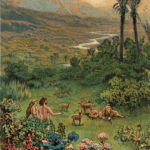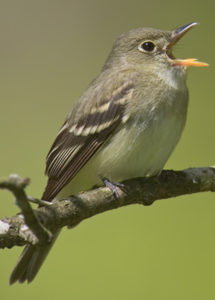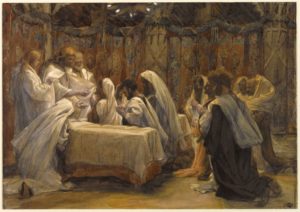Is Predatory Animal Behavior Due to Sin?
This is the third and final installment of All things Vile and Vicious. We begin with the summary questions, What do we make of fecundity, predation, and parasitism? How do we reconcile it with our notions about God?
As I mentioned in part 2, some Christians hold there was no death before Adam and Eve sinned in the Garden of Eden. If that’s true, then predation must have appeared only after death entered the world. So did nothing ever die before the fall?
One extreme version of this idea extends deathlessness to every living cell. Before the fall, grass did not die in winter, leaves never fell from trees, hair and fingernails were made of living tissue instead of dead cells, digestion did not involve the death of gut bacteria. The very phenomenon of death in any form did not exist. For this view to hold, it would mean that the most basic mechanisms of life, growth, eating food, reproduction, and even breathing were fundamentally and radically altered. “That just shows,” proponents of this view say, “the far-reaching effects of Adam’s sin.”
The problem is, such a notion is not in the Bible. The idea must be deduced from other assumptions.
On the contrary, the curse for Adam’s sin in Gen. 3:17 (“…cursed is the ground because of you”) does not mention animals. Getting food from cultivating crops would now require sweat and labor rather than being freely provided from fruit trees. Animals aren’t part of the discussion. They are assumed by the “no predation before the fall” view to be included under an umbrella of cosmic judgment reaching far beyond just the soil.
What about Adam naming the animals?

Were there carnivores before the fall then? Scripture does not suggest anywhere that animal nature changed as a result of sin. God made animals the way they are, sharp teeth and all. Some may try to make Gen. 2:19-20 say that Adam’s naming of the animals implies that the Garden of Eden was a vast petting zoo containing every species of bird, livestock, and beast of the field lounging around like in a children’s picture Bible. But to do so assumes a great deal, stretches the story beyond reasonable interpretation, and creates a flood of problems downstream when we get to phenomena such as fecundity.
What about the wolf and the lamb eating together?
But what about Isaiah 65:25? “The wolf and the lamb will feed together, and the lion will eat straw like the ox?” Does this tell us how things were before man’s sin? No. This passage of scripture is a prophetic vision of the future glorified state, not the past. It is specifically about the “new heavens and the new earth” (v.17). Also, it is prophetic literature, a genre that is known to be highly symbolic and elusive. Literalistic interpretation here is a fundamental hermeneutical error.
But won’t the future heavenly kingdom return us to Edenic peace and serenity? The Garden of Eden is said to be “very good”, but not a template or baseline for the new heavens and the new earth, nor is heaven going to be a mere return to the Garden of Eden. Heaven will be vastly better.

Actually, the Garden of Eden had at least two non-heavenlike features. First, Adam and Eve had to work to tend the garden (Gen. 2:15). God made the world wild from the start. Presumably, without regular tending, the garden would have become overgrown, a jungle. It was “paradisical,” but not “perfect”—it required maintenance.
But more significantly, the devil was in the garden tempting and deceiving! Thank the Lord that heaven is not merely to be a return to Eden.
What about “Creation subjected to frustration?”
What about Romans 8:20? “For the creation was subjected to frustration…”? This verse does not support the “no death” idea either. What does it mean to be “subjected to frustration?” It’s not clear. But those who already have a “no death before the fall” assumption often naturally appropriate this verse in support. But close examination shows that it does not say anything about whether animals were carnivorous before the fall. The word “frustration” or “futility” simply cannot bear that interpretive freight.
What about Romans 5:12?
Finally, what about Romans 5:12? “Sin came into the world through one man, and death through sin”? This may appear to be the silver bullet against my argument. I face the problem that to exegete this verse in context would take more space than I have. And when a verse had been read the same way for decades, it becomes very difficult to see it any other way. Suffice it to say that death in this verse is spiritual death that spread to mankind because of sin, the death that Adam experienced the moment he disobeyed, the death that all of the program of redemption is really concerned about.
Also, don’t miss that life mentioned in the passage is spiritual life, not physical, organic life.
Romans 5:12 cannot be speaking of physical death. Other verses nearby make that plain. “…death reigned from Adam to Moses…” (5:14) “…many died through one man’s trespass…” (5:15) “For if because of one man’s trespass, death reigned…” (5:17). None of these verses makes sense unless we understand Paul to be speaking of spiritual death. We know, and Paul knew, that Adam did not die physically but spiritually, in being separated from God, the moment he ate the forbidden fruit, just as God had declared.
Spiritual life and spiritual death are in focus in all of Romans 5, spoken of in shorthand by Paul as simply “life” and “death.”
‘Sin is not powerful enough to change what an animal eats’

A more moderated version of the “no death” view does not grapple with fingernails and bacteria, just with animal predation. Some church fathers saw the bloodiness of the animal kingdom and called it a manifestation of sin, something foreign to God’s original plan that would be redeemed in the future. Animals, they claimed, ate plants in Paradise.
But by at least the 13th century, theological systemization was moving beyond this view. Thomas Aquinas in his Summa Theologica dismisses this idea: “…if all evil were prevented, much good would be absent from the universe. The lion would cease to live if there were no slaying of animals, and there would be no patience of martyrs if there were no tyrannical persecution” (ST I.22.2).
Stanford PhD and Dominican Friar Thomas Davenport explains Aquinas’ position: “Thomas rejects [the view that animals ate plants in the Garden of Eden], arguing that moral evil has many negative effects, including the corrupting of human nature, but it does not destroy our nature or the nature of other things. Sin is not powerful enough to change what an animal eats” (ST I.96.1; ST I-II.85.1) “When God willed to create lions as carnivores, he also had to permit their killing of antelopes.” He notes “Simple observation of the animal kingdom reveals that precious few animals, of any species, die at peace after a long fulfilling life.”[1]
Were animals punished immeasurably worse than man for man’s sin?
Here is another compelling argument. Remember what we saw in part 2 of this series: dizzying levels of fecundity and daily routines of predation from tiny insects to large mammals. If we try to force the cause of all animal violence under God’s curse upon the ground for Adam’s sin, then all of the daily cataclysm of animals eating each other on an immeasurable scale constitutes an exceedingly extreme and gory vengeance that God laid upon the entire animal kingdom for Adam’s sake.
From the animal’s perspective, it is a daily holocaust of more-than-epic proportions, a cosmic bloodbath of carnage. It is hardly the measured and appropriate punishment we would expect from God. Adam’s punishment is that he has to work “by the sweat of his brow” to grow crops for food. Eve has increased pain in childbearing and is “ruled over” by her husband. That’s it.
Meanwhile, the animal kingdom is a maelstrom of birthing, devouring, laying myriads of eggs, dying at spectacular rates that boggle the mind—because of human disobedience?
To say this makes God into a monster because in this view, his judgment visited upon dumb animals is outrageously overwrought, beyond any horror movie we could imagine. This line of reasoning alone is enough to put to bed the idea of animal predation resulting from sin.
It pleased God to make it so
There are thankfully much more satisfying ways to engage the question, ways that call for maturity and patient reflection. And happily, we have some scriptures that illuminate this question. In the book of Job, God boasts about the way he provides for the carnivores, taunting and chastising Job for his impudence.
Can you hunt the prey for the lion,
or satisfy the appetite of the young lions,
when they crouch in their dens
or lie in wait in their thicket?
Who provides for the raven its prey,
when its young ones cry to God for help,
and wander about for lack of food? (Job 38:39-41)
God means to say that he, God, gives prey to the lions and the ravens.
“Is it by your understanding that the hawk soars
and spreads his wings toward the south?
From there he spies out the prey;
his eyes behold it from far away.
His young ones suck up blood,
and where the slain are, there is he. (Job 39:26,29-30)
God boasts to Job about his amazing carnivores in the context of their original creation! He takes credit for the ways of the hawk and eagle, their flight, their nesting high on the mountains, their predatory hunting, and the bloodthirst of their young.
A sacramental mystery?
Now with fear and trepidation, I come to most audacious and controversial section of this entire series. It is based on no clear teaching of scripture, but it is a theologically-informed conjecture. So strap yourself in.
In Genesis 9, God gave man permission to eat meat. Before, he only ate plants. Following the story of Noah’s Ark, all the animals were permitted as food. The only thing he may not eat is other humans. Cannibalism is repugnant in most cultures around the world whether they believe in God or not.
Have you, like me, ever wondered about Jesus’ hair-raising words in John 6? “Unless you eat the flesh of the Son of Man and drink his blood, you have no life in you.” Many of Jesus’ followers left him after he said this.
Why, when Jesus instituted the New Covenant during Passover before his crucifixion, would he use the metaphor everyone recognized as cannibalism? “This is my body given for you. Take and eat,” and “my blood of the new covenant…drink of it.” Of all the gestures he could have used, he chose one that was completely shocking and repugnant the world over.
But in the economy of Jesus, consuming his flesh and blood is “true food” and “true drink.” Eating Jesus’s body and blood in the sacrament of communion would give spiritual nourishment. This is key: we were forbidden to eat human flesh, until Jesus. Now, it is commanded! God’s people experience a sort of spiritual whiplash. It was so shocking that people in the 2nd and 3rd century slandered Christians, striking horror in every breast, accusing them of the practice of cannibalism in their worship services.
But this is the new way. Eating Jesus flesh and blood spiritually nourishes us. Sacramentally cannibalizing Jesus is commanded as the duty of the faithful.
Alright. Are you ready? When animals prey upon and eat each other, a harkening suggestion of cannibalism, they are nourished.
They. Are. Nourished.
It is not forbidden, it’s not fallenness. It is God’s plan. Is the entire animal kingdom around us is engaged in a behavior mirroring a sacramental ritual of nourishment?
 What if they are all, billions and billions of creatures, declaring the goodness of God’s plan by constantly being nourished upon each other? What if cannibalism has been forbidden in the human conscience for all ages until Christ, but daily acted out around us for millennia in the predation of animals that has been declaring to us, “Behold this mystery! You feel horror, you feel shock, but that’s just a placeholder for true awe.” And Christ’s institution of Holy Communion is born witness to by an infinite company of created creatures who have been foreshadowing the mystery from the beginning!
What if they are all, billions and billions of creatures, declaring the goodness of God’s plan by constantly being nourished upon each other? What if cannibalism has been forbidden in the human conscience for all ages until Christ, but daily acted out around us for millennia in the predation of animals that has been declaring to us, “Behold this mystery! You feel horror, you feel shock, but that’s just a placeholder for true awe.” And Christ’s institution of Holy Communion is born witness to by an infinite company of created creatures who have been foreshadowing the mystery from the beginning!
What if predation, far from being a result of sin, is actually a ubiquitous celebration of blessing and nourishment among the mute creatures? That would mean the sacramental mystery we participate in when we take communion is mirrored a trillion times daily, in the oceans and every inch of soil, in the animals consuming each other and finding nourishment—the animals giving their bodies to each other and receiving in a kind of sacred and mysterious participation in the Life that God bestowed on earth. What if this is part of God’s original blessing of all creation, declaring it “very good,” that eating and being eaten is part of the fabric of the primordial blessing of God?
This is overwhelming to me. If it’s true, it means that every insect, fish, bird, and beast is involved in a cosmic interrelationship of feasting, giving life, nourishing. And it’s been going on all around us since the beginning, and we never knew.
And when we all stand before God and someone is bold enough to say, “Where were you God? I never saw you. How could I believe in you?” Maybe he will say, “Alas that your eyes were so blind to the tapestry of divine mystery hanging all around you in such exuberant abundance.”





